

Collective intelligence. Types of collective intelligence Collective intelligence is shared or group intelligence that emerges from the collaboration, collective efforts, and competition of many individuals and appears in consensus decision making.
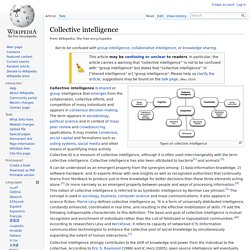
The term appears in sociobiology, political science and in context of mass peer review and crowdsourcing applications. It may involve consensus, social capital and formalisms such as voting systems, social media and other means of quantifying mass activity. Les maîtres ignorants » L’intelligence collective (fiche de synthèse) Cette fiche est une proposition de synthèse des différentes interventions lors de la session d’« autoformation » du 20/10/2012, à laquelle une quarantaine de personnes ont participé.
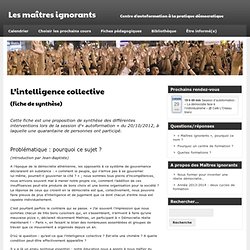
Problématique : pourquoi ce sujet ? European Centre For Collective Intelligence - Comment, ensemble, faire progresser l'Intelligence Collective ?
Dr. Peter H. Diamandis — We are evolving into meta-intelligence group-minds. Et si l’internet et le numérique changeaient tout ? Ce texte est inspiré des présentations aux Rencontres Intelligence Collective 2006 à Nîmes de Bruno Bachimont " Support de connaissance et Intelligence Collective ", de Evelyne Biausser " le projet en environnement complexe comme émergence d’intelligence collective " et de Pierre Levy " IEML, finalité et structure fondamentale " ainsi que diverses autres lectures et réflexions… Plutôt que de considérer les technologies de l’information et de la communication comme une interface entre l’homme et les mondes virtuels, nous pourrions considérer que l’homme avec sa capacité d’abstraction est lui-même une interface entre le monde matériel que nous observons et le monde des connaissances, des idées1.
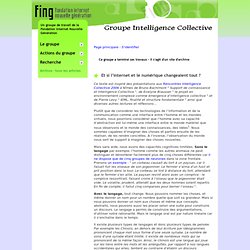
Nous sommes capables d’imaginer des choses et parfois ensuite de les réaliser, de les rendre concrètes. A l’inverse, l’observation du monde nous sert de support à imaginer des choses nouvelles. Avec le langage, tout change. Douglas Engelbart: Only Collective IQ Can Save Us. Collective IQ CI Books, pdf & docs. The Metasystem Transition.
"Global brain" Custom Search. Call for Paper on Collective Intelligence : don’t miss the chance to submit yours! l. In Uncategorized by Admin February 14, 2014 Anna de Liddo from the Knowledge Media Institute of the Open University (UK) and other researchers from Spain (Universidad Politecnica and Universidad Carlos III of Madrid) and the US (Informatica Corporation, R&D) are launching a Collective Intelligence Call For Paper for a special issue on “Large-Scale Ideation and Deliberation: Tools and Studies in Organizations” to be published in the Journal of Social Media for Organizations This special issue aims to gather experiences and reports on research done worldwide to cope with the challenges that are facing large-scale ideation and deliberation platforms.
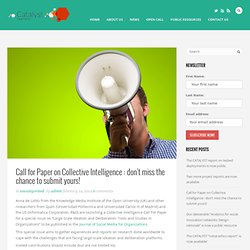
Invited contributions should include (but are not limited to): Submission deadline is planned for June 28, 2014 CFP can be downloaded here For more information and submission, please visit: the journal’s Website. CognitiveInformaticsCognitiveSynergyPaper_v1 - CognitiveSynergy.pdf. Metasystem transition. A metasystem transition is the emergence, through evolution, of a higher level of organization or control.
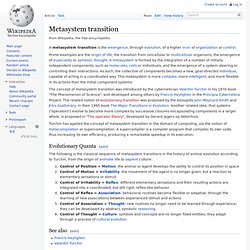
The concept of metasystem transition was introduced by the cybernetician Valentin Turchin in his 1970 book "The Phenomenon of Science", and developed among others by Francis Heylighen in the Principia Cybernetica Project. The related notion of evolutionary transition was proposed by the biologists John Maynard Smith and Eörs Szathmáry, in their 1995 book The Major Transitions in Evolution. Another related idea, that systems ("operators") evolve to become more complex by successive closures encapsulating components in a larger whole, is proposed in "The operator theory", developed by Gerard Jagers op Akkerhuis. Turchin has applied the concept of metasystem transition in the domain of computing, via the notion of metacompilation or supercompilation.
Evolutionary Quanta[edit] See also[edit] References[edit]
Collective Intelligence 2014. Global Futures Intelligence System. The Millennium Project is integrating all of its information, groups, and software into a "Global Futures Intelligence System.
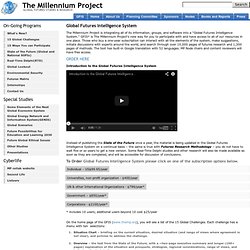
" GFIS* is The Millennium Project’s new way for you to participate with and have access to all of our resources in one place. Those who buy a one-year subscription can interact with all the elements of the system, make suggestions, initiate discussions with experts around the world, and search through over 10,000 pages of futures research and 1,300 pages of methods. The text has built-in Google translation with 52 languages. MP Node chairs and content reviewers will have free access. Introduction to the Global Futures Intelligence System Instead of publishing the State of the Future once a year, the material is being updated in the Global Futures Intelligence System on a continual basis – the same is true with Futures Research Methodology – you do not have to wait five or so years to get a new version. . * includes 10 users; additional users beyond 10 cost $25/year. How to Build a Collective Intelligence Platform to Crowdsource Almost Anything. Introduction The MIT Center for Collective Intelligence recently published an important overview of the theory and mechanisms behind successful crowdsourcing efforts.
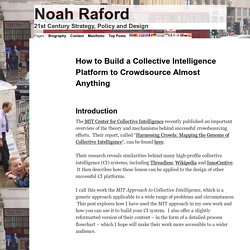
Their report, called “Harnessing Crowds: Mapping the Genome of Collective Intelligence“, can be found here. Their research reveals similarities behind many high-profile collective intelligence (CI) systems, including Threadless, Wikipedia and InnoCentive. It then describes how these lesson can be applied to the design of other successful CI platforms.
I call this work the MIT Approach to Collective Intelligence, which is a generic approach applicable to a wide range of problems and circumstances. The World Knowledge Dialogue - The World Knowledge Dialogue. Catégorie:Intelligence collective. Le groupe Intelligence Collective de la Fing. Olivier Zara - Consultant en management & médias sociaux - Montréal Quebec Canada.
Nova Spivack. Transitioners. Howard Rheingold. Swarm intelligence.